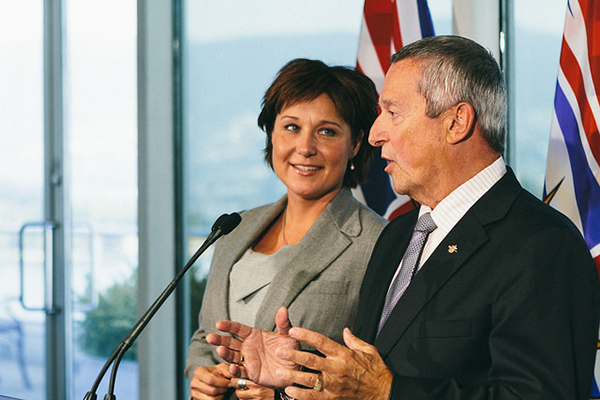A press conference with Premier Christy Clark and Education Minister Peter Fassbender this afternoon didn't reveal much more about a proposed teacher settlement than what has already leaked to the media.
Clark confirmed the proposed deal is six years, though she did not give specifics on the wage increase, which other media has speculated to be 7.25 per cent overall. The contract, the longest in the teachers' union history if accepted, would mean labour peace with teachers for at least five years.
"A negotiated settlement is really important, because it allows us to reset that relationship [between teachers and government] that has been dysfunctional for so long," Clark said.
Fassbender added if teachers vote to ratify the deal, which could happen as early as Thursday, his greatest concern is to move ahead and "make our education system even better than it is today."
Few details were provided at the press conference out of respect for the teachers' union, whose members had not yet seen the details of the proposed agreement. BC Teachers' Federation President Jim Iker will address media and the public later this afternoon with more details on the proposed contract.
The government did say it's in talks with school districts about ensuring that students get a full school year, especially students in Grades 11 and 12.
"Superintendents and administrators are working on plans, and we will be announcing that as soon as the vote is ratified by both the teachers and the trustees," Fassbender said.
Government, not districts, funding deal
Contract cost details weren't provided, either, but the education minister said the proposed deal is within the government's fiscal framework -- it had previously offered teachers seven per cent over six years. Unlike the 2013 CUPE support workers' agreement where school boards had to pick up the tab, he said the government would cover the cost of the teachers' deal.
He said that taxes will not be raised, nor will government go into deficit to cover the cost.
Districts, however, will be forced to pay the government 100 per cent of all strike savings accrued in September. In May, the Education Ministry announced that districts would repay 80 per cent of strike savings to government.
Earlier this month, the government said strike savings would be used to pay for the $40-a-day childcare reimbursement aimed at parents with children 12 and under.
Court case unaffected
The proposed agreement will also include money for handling retroactive grievances dating back to 2002 for class size and composition issues related to the B.C. Supreme Court rulings on Bills 28 and 22.
But Clark said that won't impact the pending appeal of the Bill 22 ruling beginning next month. The government contests that ruling, which ordered the government to restore teacher bargaining rights stripped from their contracts in 2002 and pay the union $2 million in damages.
“We've agreed that we will settle the outstanding grievances that are there, and that was a major step forward on both sides. But it was key to making the agreement work at the end of the day,” she said.
“There was a major potential financial liability predicted to the education system, and we decided that it was worth settling that liability for a smaller number, ultimately, in setting aside those grievances in the context of this agreement.”
That means that grievances dating back to 2002 will not be subject to the upcoming ruling. Still at issue would be the $2 million in damages, class size and composition bargaining in future, and whether the government bargained in bad faith during the 2012 negotiations.
Iker showed 'courage': premier
Clark said the only pressure she felt to reach a deal came from British Columbians, not the Chinese government as had been suggested by media after the Chinese consulate reportedly met with the provincial government over concerns the ongoing strike would impact their students studying in B.C. China is one of the largest sources of international students in the province.
She said credit for the deal goes first and foremost to parents and students for their patience during the strike. But Clark gave equal credit to mediator Vince Ready and negotiators for the teachers and their employer, singling out union President Iker for "showing real courage" in accepting the proposed deal and "stepping away from what was really a dysfunctional relationship" between teachers and government.
Neither she nor Fassbender, who credited Clark's leadership for allowing both sides to reach a deal, mentioned the employers' association's chief negotiator Peter Cameron by name. ![]()
Read more: Education, Labour + Industry
















Tyee Commenting Guidelines
Comments that violate guidelines risk being deleted, and violations may result in a temporary or permanent user ban. Maintain the spirit of good conversation to stay in the discussion.
*Please note The Tyee is not a forum for spreading misinformation about COVID-19, denying its existence or minimizing its risk to public health.
Do:
Do not: